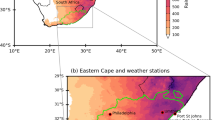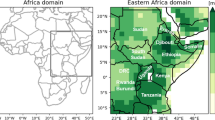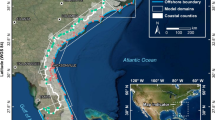Abstract
One very specific operational requirement of the Tropical Cyclone (TC) Programme of the Regional Specialized Meteorological Centre, New Delhi is to provide 12-hourly forecasts valid up to 48 h (preferably 72 h) on the intensity of cyclones over the southern Indian Seas. In this paper, a simple empirical model for predicting the intensity of TCs occurring in the Bay of Bengal is proposed. The model parameter has been determined from a database assembled on 30 recent cyclones, and the model itself is based on the assumption that a TC intensifies exponentially. A method for correcting the forecast during subsequent observation hours (6- or 12-h intervals) is also presented. The results show that the forecast skill for forecasts of up to 48 h is reasonably good. The absolute mean errors are less than 12 knots for 48-h forecasts, with the forecast skill decreasing with time. With the incorporation of a correction procedure based on the latest observations, some improvement in the forecast skill can be obtained. The model is expected to be useful to operational forecasters.


Similar content being viewed by others
References
Baik JJ, Hwang HS (1998) Tropical cyclone intensity prediction using regression method and neural network. J Meteorol Soc Jpn 76:711–717
DeMaria M, Kaplan J (1994) A Statistical Hurricane Intensity Prediction Scheme (SHIPS) for the Atlantic basin. Weather Forecast 9:209–220
DeMaria M, Kaplan J (1999) An updated Statistical Hurricane Intensity Prediction Scheme (SHIPS) for the Atlantic and east North Pacific basins. Weather Forecast 14:326–337
Fitzpatrick PJ (1997) Understanding and forecasting tropical cyclone intensity change with Typhoon Intensity Prediction Scheme (TIPS). Weather Forecast 12:826–846
Kaplan J, DeMaria M (2003) Large scale characteristics of rapidly intensifying Tropical Cyclones in the North Atlantic Ocean. Weather Forecast 18:1093–1108
Roy Bhowmik SK, Kotal SD, Kalsi SR (2005) An empirical model for predicting the decay of tropical cyclone wind speed after landfall over the Indian region. J Appl Meteorol 44:179–185
Schade LR, Emanuel KA (1999) The Ocean’s effect on the intensity of Tropical Cyclones: results from a simple coupled atmosphere–ocean model. J Atmos Sci 56:642–651
Author information
Authors and Affiliations
Corresponding author
Rights and permissions
About this article
Cite this article
Roy Bhowmik, S.K., Kotal, S.D. & Kalsi, S.R. Operational tropical cyclone intensity prediction—an empirical technique. Nat Hazards 41, 447–455 (2007). https://doi.org/10.1007/s11069-006-9053-6
Received:
Accepted:
Published:
Issue Date:
DOI: https://doi.org/10.1007/s11069-006-9053-6




